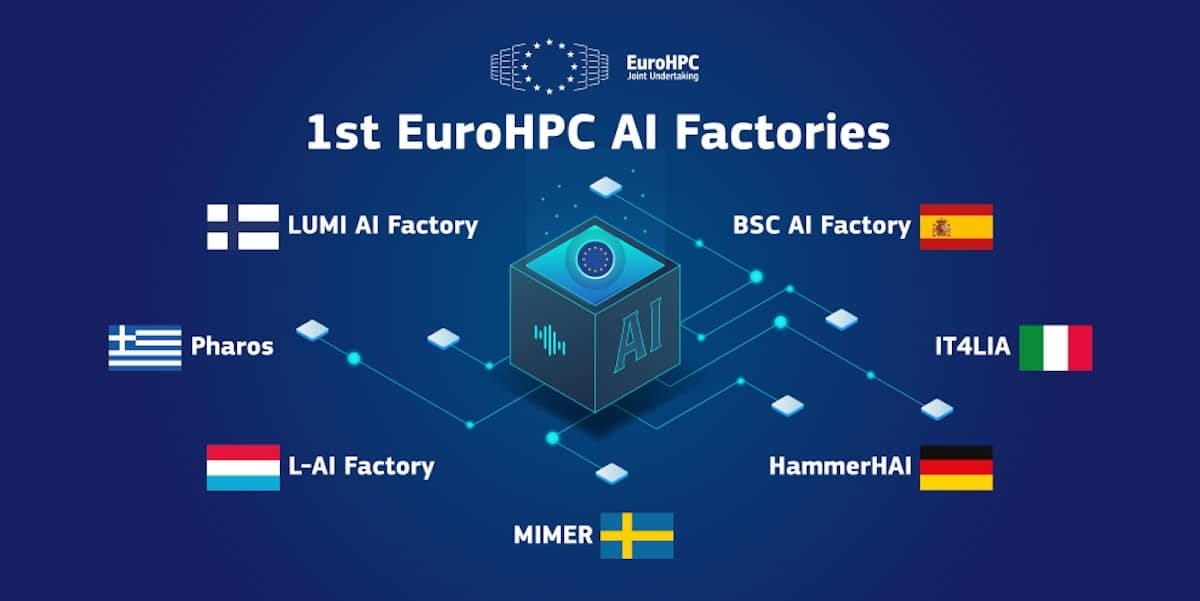The European Union has taken a decisive step to establish itself as a global leader in Artificial Intelligence (AI) with the selection of the first seven AI Factories under the EuroHPC initiative. These facilities will be located in Finland, Germany, Italy, Luxembourg, Spain, Sweden, and Greece, and will operate around supercomputers optimized for AI. With this network of factories, Europe aims to foster innovation, accelerate technological development, and facilitate access to advanced AI tools for researchers, startups, and small and medium-sized enterprises (SMEs).
A Pan-European Approach to AI
These AI Factories not only represent a technological advancement but also a joint effort of 17 European countries. They will act as interconnected hubs to provide access to high-performance infrastructures, training, and technical support. According to the EuroHPC Joint Undertaking (JU), each factory will be designed as a one-stop-shop for AI users, allowing them to tackle key challenges in areas such as health, energy, sustainability, and manufacturing.
Details on the Seven AI Factories
1. LUMI AI Factory (Finland)
The LUMI AI Factory will be built in Kajaani, next to the LUMI supercomputer. Led by Finland in collaboration with five countries, this factory will provide a world-class computing environment for AI. Its goal is to eliminate access barriers and facilitate experimentation with new AI models and applications. Additionally, it will feature a service center and a team of experts to accelerate the development of innovative solutions.
2. HammerHAI (Germany)
Based in Stuttgart, HammerHAI will be coordinated by the High-Performance Computing Center Stuttgart (HLRS) along with several German partners. This facility will integrate AI-optimized infrastructure, reducing the challenges faced by SMEs and startups in adopting advanced technologies. Furthermore, it will offer work templates, pre-trained models, and comprehensive technical support for the entire AI lifecycle.
3. Pharos (Greece)
The Pharos AI Factory will utilize the DAEDALUS supercomputer, currently being developed in Athens. Managed by GRNET, its focus will be on areas such as health, culture, sustainability, and language. Pharos will provide services for creating ethical and reliable AI products, aligned with European regulations, such as the AI Act.
4. IT4LIA (Italy)
Located at the Bologna Technopole and operated by CINECA, IT4LIA will enhance the infrastructure of the LEONARDO supercomputer for AI applications. It will provide advanced services in key sectors such as agri-food, cybersecurityCybersecurity solutions are essential in the age of… , and manufacturing. With a focus on training and AI adoption, this factory aims to bridge the gap between AI providers and users.
5. L-AI Factory (Luxembourg)
The Luxembourg factory will focus on strategic sectors such as finance, space, and the green economy. Based on the MeluXina-AI supercomputer, this facility will provide fast access and personalized support to businesses, especially startups and SMEs, promoting digital transformation in the country.
6. BSC AI Factory (Spain)
In Barcelona, the BSC AI Factory will be operated by the Barcelona Supercomputing Center and will be based on the upgrade of the MareNostrum 5 supercomputer. Its focus will include applications in public administration, health, energy, and communication. Additionally, it will have an advanced experimental platform to test new AI technologies, consolidating Spain as a key player in European technological innovation.
7. MIMER (Sweden)
Located at Linköping University, MIMER will specialize in areas such as life sciences, autonomous systems, and the video game industry. This center will prioritize the secure storage of sensitive data and will utilize advanced generative models in structural biology and personalized medicine.
Impact on Innovation and the Economy
The AI Factories represent a strategic investment to boost European competitiveness in a global market led by tech giants from other regions. These facilities will not only promote research and development but will also facilitate the creation of innovative AI-based products and services. Moreover, they will strengthen Europe’s technological sovereignty, promoting an ethical, secure, and sustainable ecosystem.
Next Steps
Agreements with the selected entities are expected to be formalized in early 2025, with the acquisition process scheduled to begin in the first half of the same year. This advancement marks a milestone in the EuroHPC JU strategy to position Europe as a global leader in supercomputing and AI technology.
Conclusion
The establishment of the first seven AI Factories in Europe reinforces the continent’s ambition to be at the forefront of the technological revolution. With advanced infrastructures, a pan-European collaboration network, and an ethical approach to AI development, these factories are set to be a fundamental pillar for the future of innovation and economic growth in the region.
via: euroHPC

